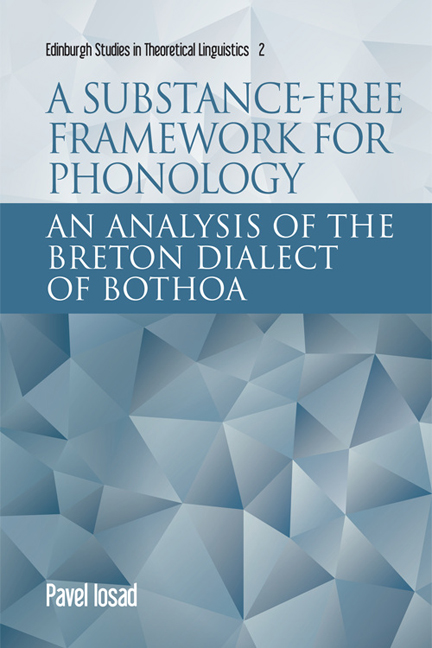Book contents
- Frontmatter
- Contents
- Acknowledgements
- Chapter 1 Introduction
- Chapter 2 Conceptual foundations of substance-free phonology
- Chapter 3 Representational assumptions
- Chapter 4 Computational assumptions
- Chapter 5 Complexity and markedness in substance-free phonology
- Chapter 6 The Breton language
- Chapter 7 Segments and representations
- Chapter 8 Suprasegmental phonology
- Chapter 9 The phonology of vowels
- Chapter 10 The phonology of consonants: palatalisation and gliding
- Chapter 11 Laryngeal phonology
- Chapter 12 Conclusion
- References
- Index
Chapter 1 - Introduction
Published online by Cambridge University Press: 20 December 2017
- Frontmatter
- Contents
- Acknowledgements
- Chapter 1 Introduction
- Chapter 2 Conceptual foundations of substance-free phonology
- Chapter 3 Representational assumptions
- Chapter 4 Computational assumptions
- Chapter 5 Complexity and markedness in substance-free phonology
- Chapter 6 The Breton language
- Chapter 7 Segments and representations
- Chapter 8 Suprasegmental phonology
- Chapter 9 The phonology of vowels
- Chapter 10 The phonology of consonants: palatalisation and gliding
- Chapter 11 Laryngeal phonology
- Chapter 12 Conclusion
- References
- Index
Summary
As the title indicates, this book has two principal aims. As is hopefully appropriate for a series called Edinburgh Studies in Theoretical Linguistics, it aims to present a coherent, relatively compact account of a particular theoretical approach to phonology – what I call the substancefree framework. A theoretical approach, however, is worthless unless can be applied to produce new insights into specific phonological data. To this end, I offer a fairly detailed account of the phonological system of a variety of Breton. This language is currently not only very fragile in a sociolinguistic perspective but also underdescribed, at least in the sense that available descriptions are frequently not informed by newer theoretical developments. This description thus serves both as a testing ground for the theoretical approach and as a way of introducing a range of new data into relevant theoretical debates.
The substance-free approach, presented in detail in the following four chapters of the book, seeks to address a growing concern regarding the scope and place of phonological knowledge in the overall architecture of the language faculty. On the one hand, we have witnessed an increased appreciation of the gradient and variable nature of much of the data that have traditionally been interpreted as reflecting categorical symbolic operations, coupled with an increased interest in accounting for variation within the speech of individuals and across entire communities. These developments have led to increased scrutiny of the foundations of formal phonology, including fundamental concepts such as ‘category’, ‘contrast’, and ‘computation’. On the other hand, within formal phonology itself there appears to be a perception that the momentum behind theoretical innovation has stalled somewhat following the burst of activity in the late 1990s and early 2000s following the introduction of Optimality Theory (OT) to the scene.1 While significant amounts of work continue to be done both in OT (and cognate theories such as Harmonic Serialism and MaxEnt grammar modelling) and in other formal frameworks, such as Rule-Based Phonology or Government Phonology, it does not always seek to address major architectural questions or indeed to defend the necessity of formal, symbolic phonology in the face of the very real empirical challenges that it faces.
- Type
- Chapter
- Information
- A Substance-free Framework for PhonologyAn Analysis of the Breton Dialect of Bothoa, pp. 1 - 4Publisher: Edinburgh University PressPrint publication year: 2017



